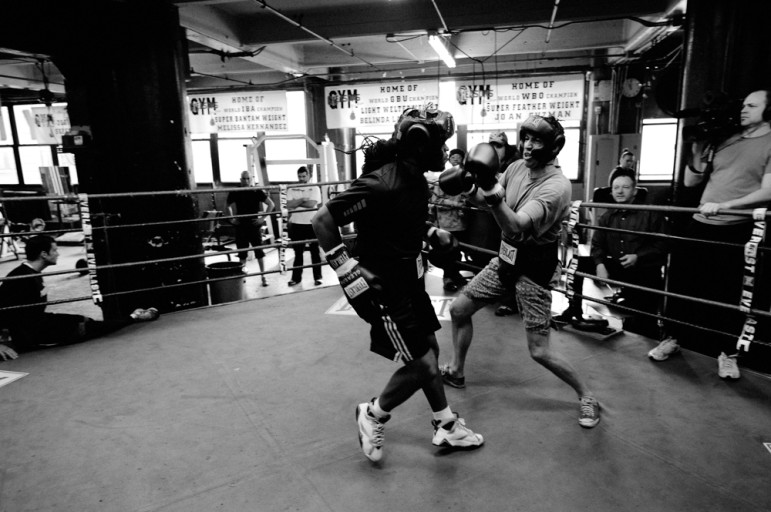
Robert Stolarik
BROOKLYN, N.Y -- Adam Friedman celebrates his 40th birthday by going in the ring with his colleague Alvin Valentine, a former Golden Gloves boxer at Gleason's Gym in Dumbo Brooklyn. Friedman and Valentine come from two entirely different worlds yet they found common ground working for Exodus Transitional Community, a non-profit organization that helps ex-convicts get their lives back on track.
[[See more images on Bokeh HERE]]
On a bitter cold winter January morning in 2008, Adam Friedman and Alvin Valentine, friends and co-workers, climbed into a Brooklyn boxing ring and proceeded to go after each other for three hard-hitting rounds. There was nothing particularly artful about what transpired in those grunting six minutes. Some solid blows were landed, there were no knock outs, and, thankfully, no blood. It was one fight of probably dozens that transpired that day.
But for both men, the boxing match represented something very different. For Alvin, a Blood gang leader and longtime inmate, it was a chance to fight for something other than his life -- to fight for fun instead of for respect, or to instill discipline in the yard or to send a message to a fellow inmate. For Adam, it was a chance to face down a monster that had tormented him since childhood -- fear.
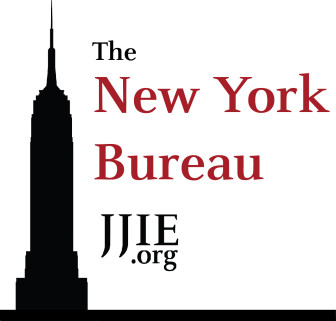 That both men would ever cross paths, let alone end up facing each other down in the squared circle, was unlikely. They came from as different backgrounds as New York City can offer, a distance much farther than the trip from the Upper West Side and Brownsville, Brooklyn that separated their apartments. The nerd and the hood, the poor kid and the middle class geek, the professional and the prisoner.
That both men would ever cross paths, let alone end up facing each other down in the squared circle, was unlikely. They came from as different backgrounds as New York City can offer, a distance much farther than the trip from the Upper West Side and Brownsville, Brooklyn that separated their apartments. The nerd and the hood, the poor kid and the middle class geek, the professional and the prisoner.
But a shared passion -- to help convicts find their way back into society and prevent them from returning to prison -- brought them together. They met at Exodus Transitional Community, a grassroots organization with the goal of helping recently released inmates make their way back into mainstream society.
There they worked together using very different pasts to forge secure futures for strangers. Adam used the Clockwork of his experience as a fundraiser and former advertising executive to organize and attend to the details that would make the programs a success; while Alvin used the Orange of his authenticity in the life, drawing on his violent past as a badge of credibility to convince the skeptical clients that change was a real possibility, that the people at Exodus weren’t peddling sentimental dross.
In the immediate wake of the fight, neither Adam or Alvin’s lives changed much. Life at Exodus went on much as it did before, the slog of work illuminated by moments of transformation with clients desperate for a change. But over the years, the fight grew to take on different meanings for both men, and it took on a life of its own to strangers who saw the fight in countless workshops and drew inspiration from it in their own way. Alvin and Adam are no longer at Exodus. They have moved on to new jobs, with the help of former New Jersey Gov. Jim McGreevey, they went on to new lives.
Here is the story of Adam and Alvin, the fight they had, and how in small ways it still shapes the men they are today.
...
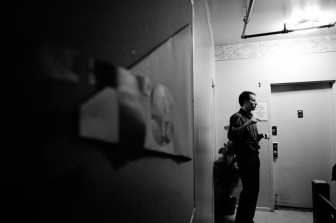
Robert Stolarik
Adam Friedman at Exodus Transitional Community in Harlem.
“Do you ever think about going back to your old life,” Adam asked.
“Every day, every day,” Alvin responded.
“Why?” Adam replied.
“Because,” Valentine answered, humorlessly “when you’re a drug dealer you never get an email saying you forgot to put something in the database.”
Alvin Valentine’s sweeping and audacious criminal career -- a career that spanned one third of his life, a career of stick-ups, armed robberies, guns, knives, shivs, blood and Bloods, gang orders and an encounter with a fresh one-legged corpse -- started with a child’s bicycle. When he was a young teen, maybe 12 or 13, Valentine committed his first crime. He was hanging out with some friends in East Harlem when he saw another group of youths. He liked one of their bicycles. They had it; he wanted it. He convinced his friends to rob them. He approached the biggest of the rival kids and beat him up and took the bike. It felt good. Beating the toughest kid filled him with pride. That day would provide a strange symmetry to Valentine’s life -- one of fighting and crime that led him to spend his teens and young adulthood in New York’s infamous prison Sing Sing, but would also save his life.
When he turned 40-years-old, Adam Friedman, a father of two and deputy director of a non-profit that worked with formerly incarcerated people trying to integrate back into mainstream society made an odd request of his co-worker and friend. Friedman asked Valentine to beat him up.
Friedman, as best as he could describe it, was in the throes of a soul-gnawing mid-life crisis. A recent father, Friedman said he did not want his children to grow up a coward the way he felt he did. He thought he would find a cure for his tortured inner-life in a boxing ring facing down a Blood gang leader who was also a decorated Golden Gloves fighter and boxing champion at Sing Sing.
Since he was a boy Friedman ran from fights. Alvin Valentine, on the other hand, would start -- and, often, finish -- them. Now Friedman and Valentine, 30 at the time of the bizarre request, were about to fight each other. The two men come from two different worlds. One lives in a Trump Tower; the other in a tiny one-bedroom apartment in Brownsville, one of the most dangerous neighborhoods in the city. But on a frigid Saturday morning those two worlds intersected in a boxing ring of a sweat-soaked Brooklyn gym.
Two Different Worlds
Friedman has always been averse to physical conflict. One spineless retreat from his teen years sticks out. Friedman was a student walking to his New Rochelle high school cafeteria to meet a girl he had a crush on. He was carrying a copy of a Shakespeare play when three classmates intercepted him. They snatched the book and begin tossing it around in a bully’s game of keep-away. Finally one of the students took the book and walked away. He brazenly stuck it in his back pocket, daring the young Friedman to come and take it. He never did.
“He was asking me to walk over there and punch him,” he said. “And I should have. But I didn’t. I was too scared.”
That moment of cowardice has shaped the man Friedman has become, and on a chilly Saturday morning nearly six years ago, he visited Gleason’s Gym in Dumbo, a waterfront neighborhood in Brooklyn, to exorcise this demon. Impending middle age has made Friedman obsessed with confronting fears that have dogged him his entire life. Months before, he finally confronted his fear of blood by donating. But a fear of fighting topped the list by a long shot.
When Friedman approached his 40th birthday he became obsessed. And because he was a former boxer and hardened former gang leader, Valentine became the target of Friedman’s desire to get this fear of fighting out of his system. He said he incessantly nagged Valentine about setting up a bout. Finally, he surrendered to superstition and tried to will the fight into existence. He mentally visualized it happening. Valentine finally relented to Friedman’s requests.
In the days leading up to the showdown, Friedman could already feel the fear that had dogged him his whole life reassert itself. As part of his training he sparred with opponents much bigger and skilled than himself. He left one of those sessions with a bloody nose and shaken confidence. He worried that the “humongous” guy he fought only went at him at half-speed. What would happen, he thought with a shudder, when Alvin came at him unrestrained? He did not look forward to the real thing.
“When I get in the ring, I want to get hit -- I want to see what I’m made of,” he said. “I’m not confident I’m made of much.”
In an interview leading up to the fight, Valentine said he thought Friedman would leave the fight a “humbler and wiser” man.
“He will learn a lot about himself,” he said. “He will learn how how he reacts under pressure and crisis. He will also learn how he reacts under pain.”
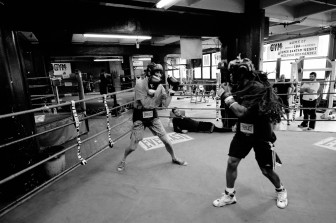
Robert Stolarik
Adam Friedman and colleague Alvin Valentine in the boxing ring on the day of the big match.
When the day for the fight arrived, the cold, implacable reality started to settle in.
“I feel weak at my core,” Friedman said as he loosened up on the mats outside the ring. “It’s a shaky, weak, unsteady feeling inside. I feel unsolid, like my muscles don’t feel firm. The more I can really picture, not just picture getting hit but feeling the hit – I picture him coming in more hitting me and clocking me – the feeling of not just getting hit but having to go for two more rounds.”
He added with a Woody Allen-like instinct for understatement: “It’s not a good feeling.”
Moments before stepping into the boxing ring, that fear is obvious on his face and in his lanky, thin body, which swims in a torn T-shirt. His gaunt, pale legs stick out of a pair of old, ragged Jams shorts. He sits by himself, a stricken look on his face. His complexion has turned ashen. His breathing is shallow. His eyes dart nervously around the gym, staring at demons no one else can see. The gym is alive with activity: boxers sparring, wrestlers crunching their bodies on the mat with a thunderous boom, the unmistakable ram-meat sound of a fist slammed into a face -- but Friedman doesn’t notice them.
Meanwhile, on the other side of the gym, his opponent is smiling. Valentine’s toned muscles pop beneath his shirt. Their outline stands out in relief. He shadowboxes skillfully. His long dreadlocks are bound tightly in a bunch. He is loose and confident. When asked if he has any concerns about the fight with Friedman, his boss, he shakes his head with a devilish smile.
“No,” he said. “I’m good.”
Before Valentine was sent upstate to serve a third of his life in prison, he fought in the Golden Gloves and sparred with an Olympic boxer.
“When this fight is over, me and Adam are returning to two different worlds,” he said. “We’re going to speak different languages, live by different rules. He’s going to his apartment in the Trump Towers, I’m going to my one bedroom apartment in Brownsville.”
As Friedman readies himself for the fight someone points to a sign taped to a column. It reads: In Case of Boxer Emergency. He does not find it funny. The amateur contestants climb into the ring. Friedman’s demeanor changes. He is no longer in a ring. He is muttering to himself, working himself into a vengeful reverie. At that moment he is envisioning his young son on a playground at PS 199 Jessie Isador Straus school on 70th Street on the west side of Manhattan. He is playing out a scenario where Valentine is picking on his son and he is going over to stop it.
Friedman and Valentine glare at one another as the referee reads the rules. Valentine’s fist crashes into Friedman’s face before the bell rings.
Good intentions don’t feed babies
“Does anybody know what recidivism means,” Valentine asks a roomful of dispirited, suspicious ex-cons.
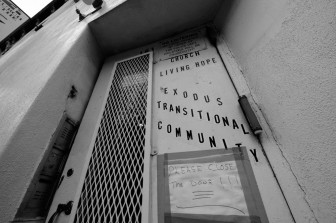
Robert Stolarik
Outside the offices of Exodus Transitional Community in Harlem.
It’s the Monday morning after the fight at the Exodus Transitional Community, an organization that helps newly released prisoners ease back into mainstream society, what’s known as re-entry in the social service business. It is housed in the Church of Living Hope, a white, crumbling four-story building on E. 104th St. In a dark second-floor room with low ceilings, three-dozen recently released prisoners sit in institutional folding chairs. A few perch on a windowsill. All of the faces are black or Latino. They are rapt as Valentine speaks.
He is part preacher, part self-help guru, part hard-nosed CEO delivering a no-nonsense business presentation. He is a different man than the sculpted fighter itching to get in the ring. He wears a pair of dress pants that hang fashionably loose around a pair of brown dress shoes. A matching colored tie hangs from a collared shirt.
After a pause, a member in the audience mutters a response to Valentine’s question, something about someone who can’t keep it together on the outside.
“If you don’t do anything to achieve that goal you become one of those people,” he says as he smiles knowingly. “You know the type.”
The crowd, loosening up a bit, chuckles in recognition.
“They talk about doing this and doing that,” he continues. “People filled with broken promises and dreams that never materialize.
“The road to hell is paved with what?”
“Good intentions,” a young man barks.
“That’s right,” Valentine sniffs. “And good intentions don’t feed babies. We’re dead serious about what we do here at Exodus.”
Valentine never had the luxury to fear fights because growing up in the city every day was one. He turned to a life of crime at an early age, barely a teenager. In prison, as he described it, he did what he had to do. That included stabbing people who stepped out of line. At about the same age that Friedman was enduring the taunts of bullies, Valentine saw his first dead bodies. The corpses were new, scattered around a counting house for a drug dealer in Harlem.
Valentine received a tip from a girlfriend whose mother counted cash for the dealer. He snuck up on the apartment and realized right away something was wrong.
“The door was unlocked,” he said. “I realized someone had beat me to it.”
He crept into the house with his gun drawn and saw a pair of mannequin-like legs poking from the doorway. As he made his way into the room he was startled by a dead woman, her prosthetic leg leaning against a blood-spattered wall, shot to death on the kitchen floor.
“It was so quiet I could hear the hum of the refrigerator,” he remembered. He slipped out of the bloodbath careful to wipe his prints off the door and anything else he touched. He was still a teenager.
After arrests on drug and armed robbery charges for sticking up a McDonald's, Valentine spent his life in various prisons upstate. At Exodus he started a new life, but one that is challenged every day. His old life constantly threatens to undo his new one.
“Every single day,” he said. “Every day. The temptation is huge.”
Shortly before his fight with Friedman, he was offered several thousand dollars a week to become an enforcer for a New Jersey drug dealer. He turned the offer down. But his small salary and the demands of impending fatherhood are always on his mind.
He says he is riveted by a vision: It is of a burned ship that he took from a world of prison and he has burned it. Now he has stranded himself in a mainstream world of jobs and schedules and responsibility and he has no choice but to make it work.
After the workshop, he ascended the steps to the roof of the church and recounted how he had to take an intern up there after a disturbing incident that occurred a while back. A client who had recently enrolled in the program had become hostile toward the the intern and started intimidating him. The intern came from a wealthy household. The client had just been released from prison. He explained to the intern how hard it is to grow up knowing you are never going to have that life, the psychological toll it can take.
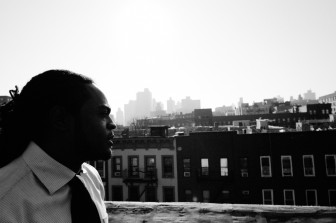
Robert Stolarik
Alvin Valentine on the rooftop of Exodus Transitional Community in Harlem.
“This is my favorite place on earth,” he said as he reached the roof, pointing with a sweep of his arm to the panoramic view of the city’s rich and poor. “It keeps me grounded. Why do I dedicate my life to this work? There are hundreds of young men down there who are going through what I went through. I can use what I know and get them on a different path.”
There was a time when Valentine saw a police officer and he worried about getting locked up. After he started working on Exodus he said he looked at them with a sense of relief.
“I know they’re there to protect me,” he said. “I’m the perfect example of what a prisoner-to-professional looks like.”
Who is this white dude?
Julio Medina, 46, started Exodus in the early 1990s from his mother’s kitchen table after serving years for being a self-described drug kingpin.
“I was this major drug dealer,” he said from his office. “I realized I could use the smarts that I used for a negative and channel that into doing something I wanted to do.”
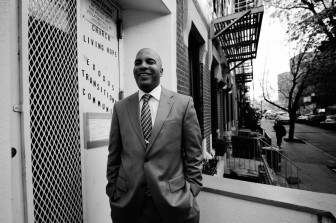
Robert Stolarik
Julio Medina, the founder of Exodus Transitional Community in Harlem, outside of the organization's headquarters.
He does the unglamorous but what he described as critical work of keeping prisoners from going through a revolving door of incarceration. Without assistance readjusting to regular life, Medina said, many ex-convicts end up back in prison.
Sharon White, who served 11 years for manslaughter, worked as a program manager. She said the work Exodus and similar organizations do is instrumental in preventing that from happening.
“The bottom line is that there are people coming home,” she said. “They’re coming home every day. Whether you like it or not. The question is what are you going to do with them?”
When they were still at Exodus, Friedman and Valentine were central parts of answering that question. But Medina came close to not hiring either of them. Friedman came in for his interview with a suit and tie, a sophisticated resume and a folder containing his work from a high powered advertising firm.
“I didn’t care about any of that,” Medina said he barked at him. “I couldn’t imagine this lanky white guy being able to deal with hard-bitten criminals every day.”
Medina indulged Friedman, reassuring him that he’d consider his application, with no intention of calling him back, that is until he saw the “lanky white guy” interacting with a room full of ex-cons, slapping them five and engaging them in a easy, friendly conversation.
“Adam really connected with them,” he said. “It was amazing. I made up my mind to hire him right then.”
Valentine started his career as a client. But even that almost didn’t happen. Valentine’s attitude was so disruptive his first day at Exodus that he was thrown out.
“He was like, ‘You all don’t know who I am,’” Medina remembered, doing his best tough-guy impression. “‘I’m Alvin Valentine. I don’t need you all.’”
If not for White, who grabbed him and told him to cool off and come back the following week, Valentine isn’t sure what he would have done once he walked out that door.
Valentine was a quick study, however, and he soon became an employee working with clients.
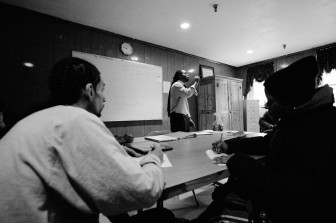
Alvin Valentine gives a lecture at Exodus Transitional Community for new clients, who come every Monday morning.
“In Alvin you have this mix that I really love,” he said. “He’s a tough guy as you can clearly see. But he can get across to people.”
Friedman and Valentine’s relationship was contentious at first. Valentine bristled at what he saw as Friedman’s dismissive manner.
“Adam doesn’t realize it, but Adam can come across as condescending,” he said. “He puts this facial expression on like he’s saying how can you not know that? I should know. He does it to me. It was definitely rubbing Alvin the wrong way.”
Valentine had spent nearly a decade living in prison where respect was the common currency. Now his supervisor was not paying it.
“Imagine Alvin comes here from prison where he called the shots and now he’s looking at this guy Adam telling him what to do in, let’s face it, a really annoying way,” Medina said.
Valentine confronted Medina about it.
“He came to me one day and he was angry,” Medina said. “He told me he didn’t think he could take it anymore. He said Adam was a sucker and all this. I told him to be patient. Friedman is a good guy.”
Valentine remembers his frustrations.
“I went in there and was like, who is this white dude?” he said.
Although friction defined most of their relationship, Medina said they developed an unusually strong bond.
“They are both committed to the work,” he said, “they just do it in their own ways. Something that each of them respect is their intelligence.”
It was the bond that was strengthened in the squared circle.
See you Monday
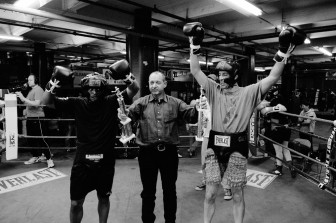
Robert Stolarik
Adam Friedman and colleague Alvin Valentine after the match.
The fight went the distance. Aside from a knockdown from a jarring combination thrown by Valentine, Friedman acquitted himself respectably. Both men were winded after going three rounds. Valentine was the unanimous victor, at least to the handful of pugilists who took a break from their workout to watch the odd match. Friedman dedicated the fight to his two sons and looked forward to the day when they could watch a tape of the fight and understand why he did it.
Valentine used it to measure his stamina. At the time he had aspirations of boxing regularly again and wanted to get into shape to go the distance for a 12-round fight.
Friedman was palpably relieved when he scooted under the ropes and took in what he had just accomplished.
“I’m glad there was a knock down,” a jubilant Friedman said, loping around the ring after the fight. “I’m glad. I feel like I got hit. And I got up!”
Valentine shouted in support: “You got up!”
Valentine had considered Friedman a friend before they fought. But now he had a newfound respect for his co-worker.
“I am very proud of Adam,” he said. “I think he did an extraordinary job. Tremendous.”
Friedman and Valentine shook hands and then hugged. As they gathered their belongings and prepared to go their separate ways the two men said their goodbyes.
“I’ll see you Monday,” Friedman said.
“See you Monday,” Valentine confirmed.
They had work to do.
The Aftermath
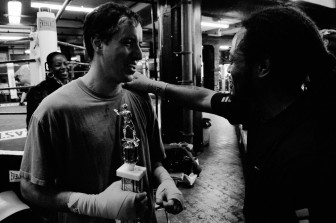
Robert Stolarik
Adam Friedman and colleague Alvin Valentine after the match.
The fight became the thing of lightweight legend around Exodus. Friedman earned the respect of his colleagues for daring to step into the ring with Valentine. Valentine would show the footage of the fight to his friends. They would chastise Friedman for not attacking when Valentine stepped back and dropped his guard to showboat.
Medina, his boss, took him aside and told him, “That took guts.”
His own father could not bear to watch the tape of the fight. He didn’t want to watch his son get hit. (That didn’t stop him from encouraging his son to, “knock him out!” the morning of the fight.)
The fight with Valentine did not have a sudden, transformative effect on Friedman.
“It had to marinate in there for a while,” he said. “But it made a difference.”
A little while after the fight, Friedman was at work late at night doing an assessment of data on Exodus clients. He was tracking the number of people who were meeting with the job development counselor. He noticed that 40 percent of the clients were not going to their meetings, which, for a newly released inmate, is unacceptable. An essential part of integrating back into society is getting a job. Everyone wants an inmate to have a job -- the parole officer, the reentry counselors and the inmate himself.
But, Friedman said, many former inmates who might be tough when faced with physical confrontation are daunted by the prospect of sitting down for a job interview. The clients would fumble for excuses to avoid meeting with the counselor. Friedman was troubled by the discovery. And then he had a revelation.
“It’s not that they were lazy,” he said. “It was that they were scared.”
The schedule at Exodus when Friedman and Valentine still worked there was this: Friday was intake day, and Monday was the introductory workshops. Valentine always led the first meeting, telling the new clients his life story, using his experience to earn their trust, and to encourage them to avail themselves of the programs at their disposal at Exodus.
After Valentine gave his presentation, it was Friedman’s turn. He headed up a workshop on the nuts-and-bolts of what the program had to offer. This time before he launched into his shpiel he played the tape of the fight.
“If I can get in a ring with Alvin,” he told them after it was over, “then you can go out on a job interview.”
The following week the head of job development sent out an email to the staff. It informed them that for the first time not one client missed their appointment for the week.
Going After the Big Dog
When the phone rang at 5:55 a.m. on a weekday a few months ago, Friedman jolted awake in a panic. His first thought was: Who died?
He answered the phone. It was former New Jersey Gov. Jim McGreevey, who was an advisor to Exodus when he worked there. McGreevey asked him how he would like to work for Jersey City working with formerly incarcerated people trying to make a go of it. Steven Fulop, the mayor, had appointed McGreevey, famous for being America’s first self-described “Gay American,” to a position as executive director of the Jersey City Employment and Training Commission. McGreevey wanted to tap Friedman to join his team as deputy director.
McGreevey has, in the wake of the public disintegration in 2004 of his political and private life after getting caught up in a gay sex scandal with a staffer, dedicated himself to reforming juvenile and criminal justice and helping people, young and old, from getting caught up in the prison pipeline. He worked closely with Integrity House, an organization that works with women prisoners and victims of domestic violence in a number of ways, from job training to substance abuse programs.
Now, back in the public sector in Jersey City, McGreevey is behind an initiative to disrupt the school-to-prison pipeline. It’s a program bringing together the city Board of Education with the building trade unions. It provides students in their junior year of high school with a union mentor, and training in their senior year to join the union upon graduation.
“I think that Alvin would probably be a prisoner or dead if it wasn’t for Jim McGreevey,” Friedman said.
About a year after the fight, Medina, his boss at Exodus, fired him. They had different ideas about what direction to take the organization.
“Someone I worked with at Exodus said most people here care about Julio,” he said. “When I worked there I didn’t feel like I was working for Exodus; I felt like I was working for God.”
“One thing Jim said about Alvin is that, ‘I can’t get him to work on the re-entry program,’” he said recounting a recent conversation. “He’s making too much money.”
From his small office in an ugly building in the Journal Square neighborhood of Jersey City, Friedman paused as he reflected on how the fight affected him. He leaned back in his squeaking office chair and stared at the drop ceiling. He said he has become not a better father, but a more confident one.
“I wanted to show my kids that you can get in a ring with Alvin,” he said. “If my Dad had stepped into the ring with Alvin maybe I would’ve grown up differently. I didn’t want to raise them to be cowards like I was. Getting into the ring with Alvin showed that I could go after the Big Dog.”
“Sometimes I wished I caught a bullet in the stomach rather than do this time”
Steven Llamos calls Adam and Alvin the “odd couple” with a resonant laugh that spoke to the absurdity of the pairing. Despite their differences, Llamos credits both men, in their own idiosyncratic ways, for saving his life.
Llanos has been out of Exodus for two years now. He relocated with his wife, whom he met through a prison pen pals program, and his eight children to Jesup, a small town in the suburbs of Atlanta. He does not think he would have made it if he didn’t meet Alvin and Adam. He went to school to become a welder and now runs a crew as a foreman. He said he intends to go back to helping former prisoners make that transition to mainstream society, but he wants to do it on his own terms. He always felt that at Exodus he was like the coach’s son -- like he was given the chance instead of earning it. Now that he has scraped together his own life, he said he feels like he can go back to that kind of work with a renewed sense of purpose. He said he hopes some day Alvin finds his way back to the reentry world, too.
Llamos, 35, had a refrain he would repeat again and again to both the clients and his co-workers at Exodus: “We are the population we serve.”
Before he left Exodus, Friedman said, Valentine started becoming “feral.” When he left and word reached him that Valentine had returned to the life he had sworn to leave behind, it didn’t come as a complete surprise.
It didn’t come as surprise to Llanos, either.
“I just think Alvin lost track,” he said. “He forgot where he had come from, what he had left behind. And you should forget that life. But there’s a catch-22 at the same time. That life we lived -- it’s the nature of the hood. He forgot the pain and got caught up again.”
Llamos said the longer a former prisoner is free, the easier it is for him to take that freedom for granted.
“The longer you’re home the easier it is to forget where you came from,” he said. “You forget about the 4 o’clock count, the guys you left behind in prison. When you forget that then you’re in trouble.”
When he heard Valentine had been shot in the summer of 2010, Llanos was relieved to hear that he survived. And he was not surprised that he turned his life around once again in the wake of the shooting.
“Unfortunately he went through that pain, but it got him back on track,” he said. “Sometimes I wished I caught a bullet in the stomach rather than do this time. Sometimes you need that pain to get back on track.”
According to his old friends, Valentine is out of the life again and working as a doorman and building manager in Long Island City, a gentrified waterfront neighborhood in Queens. It’s a job that McGreevey helped him get once he heard his former colleague had lapsed.
Llamos was in the life as far back as he could remember. He was selling crack when he was 9-years-old. He managed to slip through the cracks of the system whenever he would get in trouble. His mother, a drug addict, would always be there to bail him out because she knew she would be able to get drugs from her son as compensation for putting her out.
Llanos was on his way to get fronted some crack so he could get back into the drug dealing game when a wrong turn in East Harlem landed him in front of the white church that housed Exodus. A group of men were outside on a smoke break, and he overheard them talking about prison. Llanos had recently been released after finishing a sentence for drug dealing. One of the group invited him up for some lunch and a coffee. It was Valentine.
“Alvin invited me upstairs, he invited me to his workshops, he gave me lunch and coffee, something to drink,” Llanos said. “I never left after that.”
He stayed on, first as a client, then as a counselor and then was moved up to project manager.
Valentine’s example gave him the confidence to keep his head down and throw himself into the work. Llanos had a similar background, a child who grew up in a world of violence and crime. He eventually looked up to Friedman as a father figure, a source of inspiration as he negotiated the pitfalls of fatherhood.
“My dad was pretty much not in my life,” Llanos said. “Adam was like the father I always wished I had growing up. When I saw Adam and the way he was coaching little league, and being present in his kid’s lives, watching him be the father he was made me become the father that I am.”
But that was not always the case. Llanos said initially he was weary of Friedman.
“It was that old prison mentality,” he said.
As a child and teen, Llanos only saw white people as members of a system that ground him, and people like him, down. When his friends got beaten by the cops, he said, the officers were always white. When he got placed in foster care, the people that wrenched him from his family, they were white. When he was in prison, it was always a white corrections officer that was meting out discipline.
“I don't know what they call it, transference and stuff like that,” he said. “But it started to change when I saw that tape, that’s when I started to trust Adam. It brought humor. He was funny; he was goofy.”
“People from the hood, we don’t do yoga”
In prison, Llanos said, you develop a “sixth sense.” When something is about to go down in the yard or in the mess hall, that sixth sense starts humming. One afternoon at a workshop he was leading at Exodus, Llanos said his sixth sense was in overdrive. Two clients in the room had a turbulent history in prison. One of the men had ordered a stabbing of the other client’s friend. The old score was about to be settled in the church basement.
“It was really getting to the point where if we were in prison it would’ve been on,” he said, remembering the incident. “They made eye contact and you could feel it going through you. Something was brewing. It was about to happen.”
Llanos interrupted his workshop and asked if there was a problem. One man responded: “Yeah -- him.”
The other man stood, ready to fight. Llanos pleaded for them, out of respect, to give him a minute, one minute.
“I grabbed the tape, and threw it in there,” Llanos said.
The two rivals watched the tape of the fight, and Friedman’s and Valentine’s preparation, and their camaraderie after it was over.
“People from the hood, we don’t do yoga,” he said, referring to a portion of the video where Friedman is folded into a ball. “When they saw Adam doing yoga they were on the floor cracking up.”
He said watching the fight lifted the tension in the room. A week later when the two men met for staff lunch and held a service, they were side by side, part of a circle holding hands.
“That tape, that fight,” he said. “It was like magic.”
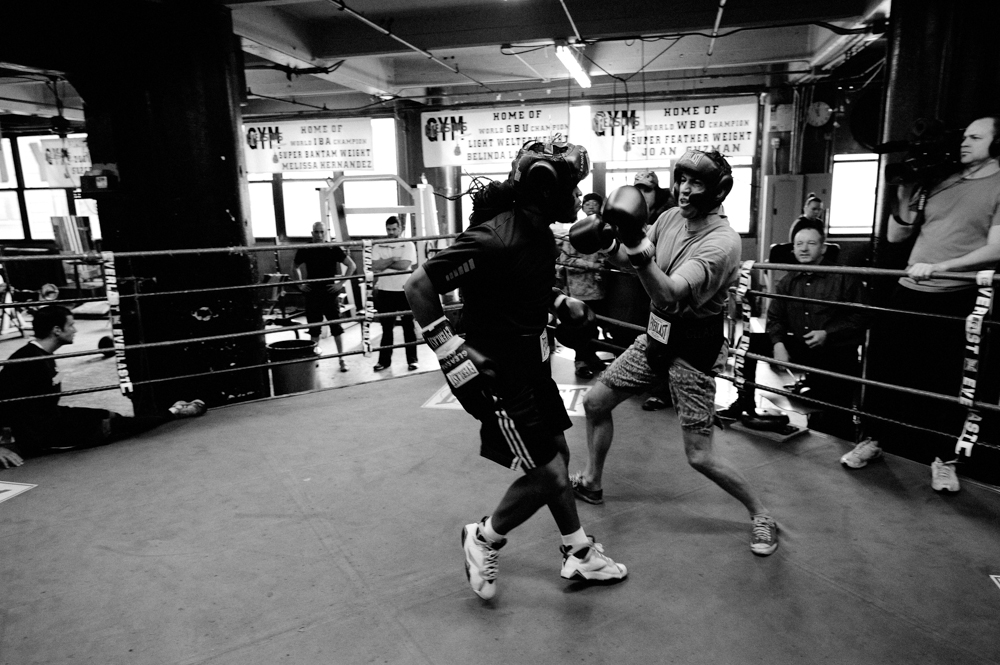
Pingback: In and Out of the Boxing Ring, Two Men Confront Very Different Demons — The Good Men Project
Hi,
I worked with Jim, Adam, Julio, Alvin and Julio at Exodus. The thing you need more in life than anything else is encouragement. The thing you never expect is the chance to watch miracles happen. There was a lot of love in that church.
I hope Alvin is Ok. I should have followed up a long time ago.
Best,
Evan
Pingback: In and Out of the Boxing Ring, Two Men Confront Very Different Demons | Bokeh